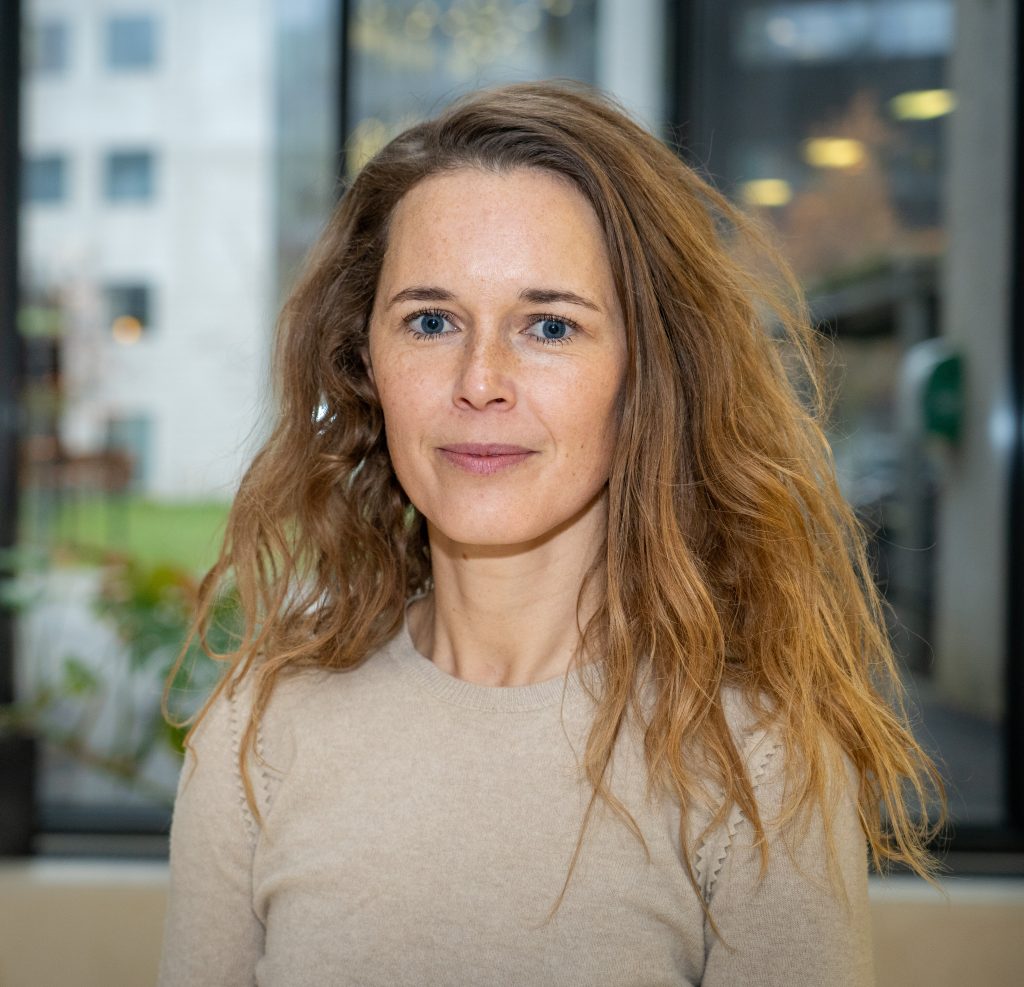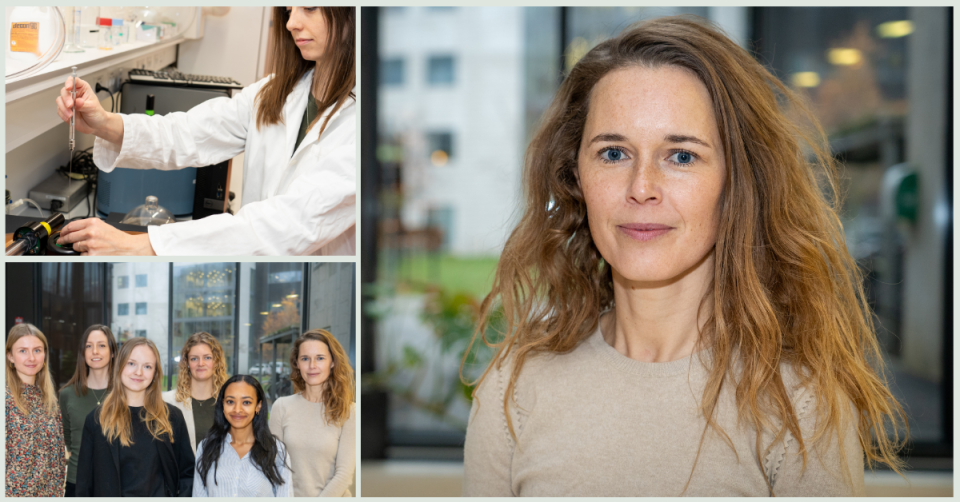15 December 2023
Assistant Professor Stine Rønholt from the LEO Foundation Center for Cutaneous Drug Delivery at the Department of Pharmacy, University of Copenhagen, is among the three talented skin researchers who are the first to receive a LEO Foundation Dr Abildgaard Fellowship of DKK 12 million.
The LEO Foundation Dr Abildgaard Fellowships are a new LEO Foundation grant instrument – each fellowship worth DKK 12 million for a five-year period – established in 2023 to support skin research talents who have the ambition to establish or expand an independent research group at a not-for-profit Danish research institution, and who are also starting their careers as research leaders.
Assistant Professor Stine Rønholt from the LEO Foundation Center for Cutaneous Drug Delivery receives the fellowship to develop her research project with a focus on new ways to treat chronic skin diseases, like eczema – or atopic dermatitis – directly on and into the affected parts of the skin. With this five-year research grant, Stine Rønholt will be able to strengthen her research group at the University of Copenhagen, specifically exploring “ionic liquids” as a novel approach to treating skin disease.
Stine Rønholt receives a LEO Foundation Dr Abildgaard Fellowship through the 2023 research theme, Skin Physiology and Cutaneous Drug Delivery. Her skin research lends itself well to the theme, as she will develop a multimodal research platform to explore interactions between the skin barrier and local drug delivery systems.
Stine Rønholt
Assistant Professor, University of Copenhagen, LEO Foundation Center for Cutaneous Drug Delivery, Denmark, DKK 12m

Project title – ILnext: Unravelling the potential of ionic liquids as next generation cutaneous drug delivery systems
Fellowship theme: Skin Physiology and Cutaneous Drug Delivery
Stine Rønholt’s vision is to explore new ways to treat chronic skin issues (like eczema) directly on the skin. Today, such diseases are primarily treated by immunosuppressants, that upon systemic exposure can weaken the immune system. Atopic dermatitis is effectively treated by a type of medicine called JAK inhibitors, administered as tablets. Yet, direct administration of JAK inhibitors via the skin is hampered by the skin’s tough outer layer.
Stine Rønholt’s project will develop a new technology that treats eczema directly on the skin. To do so, Stine Rønholt is using a novel approach, “ionic liquids,” which can increase the drug solubility allowing for high dose treatment. Much like how sugar dissolves in water. This approach will help to deliver more medicine into the skin, targeting and treating eczema more effectively. Stine Rønholt’s goal is to figure out how to make this work for two specific JAK inhibitors, baricitinib and abrocitinib. Focus here is currently directed towards understanding how the ionic liquids used work together with the drugs, as well as what happens to the skin when the drug is applied. Even though the drug needs to be transported across the skin to where it is going to work, the technology should not cause any irritability to the skin. Special biophysical techniques are to be used to study all these things closely.
Stine Rønholt hopes to be able to deliver a high amount of medicine directly to a problem area without any uncomfortable procedures by using this approach. This could enhance treatment and lower the frequency of medicine required. Additionally, insights gained from Stine Rønholt’s project may pave the way for a new and improved method of addressing skin issues in a more efficient manner.
An emerging leader investigating targeted treatment for eczema
Stine Rønholt joined the LEO Foundation Center for Cutaneous Drug Delivery as Assistant Professor in 2022. Since then, she has established a dedicated research group, concentrating on the development of innovative “ionic liquids” for the treatment of skin diseases.
It is at the LEO Foundation Center for Cutaneous Drug Delivery at the University of Copenhagen that she hopes to develop her leadership profile, pushing for a novel approach to the treatment of chronic skin conditions.
“The fellowship grant from the LEO Foundation enables me to strengthen my research group at the LEO Foundation Center for Cutaneous Drug Delivery focusing on the development of new and improved treatments for patients suffering from atopic dermatitis and potentially other skin diseases,” says Stine Rønholt.
Given that approximately 25% of the global population suffers from chronic skin conditions – atopic dermatitis of high prevalence within this group – her work holds significant promise.
“My dream is to develop a drug delivery system that allows transport of a high amount of medicine directly to the affected skin area. This could offer patients lesser side effects compared to current treatments, thereby enhancing patients’ quality of life,” Stine Rønholt explains.
Stine Rønholt points out the difficulty in treating eczema due to the skin’s tight outer layer, which makes it hard for medicine to penetrate the skin. To address this, she is exploring a novel approach: the use of patches with tiny needles that painlessly enter the skin to deliver “ionic liquids” directly. These liquids can hold a large amount of medicine much like how sugar dissolves in water. Stine Rønholt hopes this innovative method will overcome the barrier posed by the skin’s outer layer, thereby improving eczema treatment.
Fostering global collaboration
Stine Rønholt places international collaboration high on the agenda for the future of her research, as it is through this that she aims to generate scientific progress:
“We will foster collaborations and work closely with both national and international leading experts in the field to extend our research beyond the current state of the art. By teaming up with the best scientists, all aspects are in place to generate ground-breaking results within the field of advanced treatment of dermatological conditions,” she says. She also highlights how the group is focused on utilizing cutting-edge technology: “Our aim is to benefit from using new technologies such as quantum computing and artificial intelligence, alongside resources like the European Spallation Source in Lund, to enhance our research.”
Pioneering new and improved treatments
When asked about her visions, Stine Rønholt openly shares her ambitions for herself, for her research group, and most importantly, for the patients.
”My vision is to establish a pioneering research group that bridges skin physiology with the development of new and better treatments for direct application on the skin. We aim to build a unique experimental platform that utilizes state-of-the-art biophysical techniques. This approach will allow us to gain new insights into the complex interactions between medications and the skin barrier. By doing so, I hope that we can pioneer new and improved treatments of cutaneous skin diseases, ultimately improving the lives of people living with skin diseases.”
In 2023, three talented skin scientists received a LEO Foundation Dr Abildgaard Fellowship. Discover more about the grantees and details of these fellowships here.
About LEO Foundation Dr Abildgaard Fellowships
The LEO Foundation Dr Abildgaard Fellowships program aims to support talented, emerging research leaders, both Danish and international, with ambitions to establish or expand an independent research group at a not-for-profit Danish research institution, and to pursue novel and important research questions within skin and skin diseases.
The LEO Foundation Dr Abildgaard Fellowship program is thematic and is announced once a year in open competition. Grants of DKK 12 million are awarded for a five-year period.
In 2024 the application deadline is 17 April (16:00 CEST). Applicants can apply within one of the two themes, Advanced Therapeutics Research in Skin Diseases and Systems Medicine in Dermatology. Read more about the program and eligibility criteria here.
About the LEO Foundation
The LEO Foundation is one of the largest private funders globally of independent skin research. The Foundation provides philanthropic grants with the aim to support the best international research in skin diseases and make Denmark a global beacon for skin research. Over the past decade, the LEO Foundation has given more than DKK 1 billion in grants and awards to independent skin – in Denmark and all over the world.
